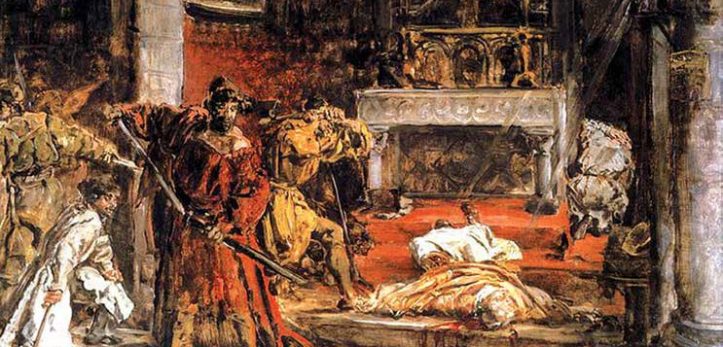Confessional state (Part 2)
Author: Grzegorz Kucharczyk,
"Love One Another!" 38/2017
Catholic Church

Read also: Part 1
Read also: Part 3
In the Middle Ages, the Church on many occasions made an effort to ensure autonomy unto itself, thereby restricting the designs of the secular power to govern not only in the political and social spheres, but also in the spiritual one.

The Church and the idea of the rule of law
The renewal of the western Church as part of the Gregorian Reforms of the 11th century encompassed also this aspect of relations between the papacy and empire. Successive popes made efforts to prevent the secular power – in this case the empire combined with the dignity of the King of Germany – from claiming the right to appoint bishops (investiture) or imposing rules of internal Church discipline. As the contemporary American political scientist Francis Fukuyama writes: “In the 11th century, the Catholic Church announced its independence of the secular power, organized itself into a modern hierarchy and then became an advocate of the supranational European rule of law. […] Without the conflict of investitures and its consequences, the rule of law would have never taken so deep a root in the West.”
The Age of Enlightenment brought another attempt to subdue the Church by the secular power
Fukuyama does not hesitate to conclude that “two of the fundamental institutions that were crucial for economic advancement – individual freedom of choice regarding social and ownership relations and the restriction of political power by transparent and predictable law – were enacted by a pre-modern institution, namely the medieval Church.”
Not infrequently, the pastors of the Church paid a high price for this. St. Gregory VII – the pope who is most often associated with the uncompromising stance towards Emperor Henry IV and successive antipopes appointed by him – at a certain moment was forced to leave Rome and died in exile (in Salerno) in 1085. The bishops who, following the example of St. Ambrose, sometimes reminded rulers that their power was not above God’s Commandments, suffered martyrdom.
Patron of moral order
In this context, one is reminded of St. Stanislaus, the bishop of Kraków, martyred on the orders of King Boleslaus the Bold in 1079. The ruler took revenge on the bishop for his courageous act of reminding the king of the need to submit to divine law. In this context, St. Stanislaus was named patron of moral order by Pope St. John Paul II. The pope said on Jasna Góra on June 5, 1979: “The patronage of the moral order that we attribute to Saint Stanislaus is principally linked with the universal recognition of authority, of the moral law, that is to say of the law of God. This law places an obligation upon everyone, both subjects and rulers. This is the strength of Stanislaus: one law for all. It constitutes the moral norm, and is an essential criterion of man’s value. Only when we begin from this law, namely the moral law, can the dignity of the human person be respected and universally recognized. Therefore, morality and law are the fundamental conditions for social order.”
The bishops who, following the example of St. Ambrose, sometimes reminded rulers that their power was not above God’s Commandments, suffered martyrdom
This is the road that the Church paved for the West to build a state founded on the rule of law. First, the uncompromising proclamation of the primacy of morality – as expressed in natural law – over the law enacted by the secular authorities. The latter must be rooted in natural law, inscribed by God in the heart of every man. It not only calls for the obedience of subjects (citizens) to the authorities, but also imposes on the authorities an obligation to respect the autonomy of the Church and the legitimate rights of individuals.
Kings at the head of the Church
This vision was seriously challenged by the leaders of the 16th-century Protestant Reformation. It was a rule that in countries where the Reformation won, the secular power – which at the early stage of the Reformation was a decisive factor in making people embrace the teachings of Luther and Calvin – attained at once supremacy over spiritual power. Protestant rulers, right after confiscating Church property, declared themselves heads of newly established religious communities.
A case in point is King Henry VIII of England who in 1534 pronounced himself “the head of the Church of England”, breaking ties with the Apostolic See. Thus, after many centuries in the West, we witnessed an attempt to introduce the principle that had guided successive Byzantine emperors since Constantine the Great. They believed themselves to be “external bishops” and as such allegedly had the right to make decisions in religious matters.
Henry VIII was very quick to make use of the powers he had arrogated to himself and as the ”head of the Church of England” at once “annulled” his marriage to Catherine of Aragon of twenty years’ standing. Such great martyrs of the Church, as saint Cardinal John Fisher or St. Thomas More – who did not recognize this usurpation and paid for their refusal with their heads in 1535 – were not only the witnesses of faithfulness to God’s law, but also confirmed with their blood the ancient teaching of the Church about the distinction – not a separation – between the two powers: secular and spiritual.
It was for this reason that the Catholic Church objected to the principle of cuius regio, eius religio (Whose realm, his religion) pushed by the Protestant princes of the German Reich in the 16th century. Adopted in 1555, this principle meant that if the ruler was a Protestant his subjects were to be sooner or later Protestants. In this way, the Protestant side tried to safeguard itself against the evangelizing efforts of the Catholic church, the inevitable result of which would have been the return of entire communities to this Church.
It is in the context of the principle of the primacy of power over human conscience, as this is what the formula “Whose realm, his religion” – pushed by the Protestant side – boils down to, that the words of Polish King Sigismund Augustus should be taken. In the 1550s, when the Protestant influence in Poland was at its zenith, the king was persuaded to follow in the footsteps of Henry VIII and establish in Poland a national church independent of Rome. The last monarch of the Jagiellonian dynasty replied to this: “I am not the king of your consciences.” It can be claimed that these words epitomize the Catholic rule of conduct to be followed by the secular power in matters of conscience and religion; a power that knows that its influence stops short of these domains.
Absolutism of the Enlightenment
The Age of Enlightenment brought another attempt to subdue the Church by secular power. This time in the name of progress. The Enlightenment, so highly critical of the status quo and above all of the revealed religion, was nowhere near as critical of the absolute power of kings. Under one condition, however: provided that kings will rule in the name of progress but understood in the way the high society of the day fancied. It took progress to mean ridding the public sphere of the Church, being a prelude to the removal of sacrum from the political and social domains of human activity.
Protestant rulers, right after confiscating Church property, declared themselves heads of newly established religious communities. The Age of Enlightenment brought another attempt to subdue the Church by the secular power
Already prior to the French Revolution, there was no shortage of rulers who subscribed to such a programme known as enlightened absolutism and practised also in many Catholic countries. A prime example of the pursuance of such policies is the reign of Emperor Joseph II who ruled in 1780-1790. He very dynamically modernized his realm, founded many new institutions and expanded bureaucracy and the army. He also believed it to be his duty to interfere with the internal matters of the Church. Not only did he dissolve many religious orders, particularly contemplative ones which he believed to be “useless”, but also felt to be authorized to interfere with the minutiae of Church life. Imperial decrees, for instance, prescribed the number of candles that were allowed to stand on altars in Austrian churches.
Let’s imagine a reverse situation: the Church dictates an 18th-century state how many inkwells there are to be on the desks of officials working in court chancelleries! Naturally, it would be considered an inadmissible – and also ridiculous – interference by Church authorities with matters reserved to the competence of state authorities.
Alternatively, let’s imagine a different situation. All of a sudden, the Church demands that a certain group of officials of an 18th-century state be expelled from the country in which they work, because the Church believes that they are involved in all kinds of plots and rapaciously amass political influence and money. It was precisely this policy that was adopted by enlightened absolutism governments in the 20 years preceding the French Revolution when the Jesuit order was banished from many countries. First from Portugal, and then from Spain, countries of the Apennine Peninsula and France, the Society of Jesus was expelled on fabricated charges of plotting and engaging in subversive activities.
The religious state of the French Revolution
The French Revolution opened a new chapter in the many centuries of the struggle of the Church for autonomy from secular power desiring complete monopoly. For the French revolutionaries strove to subdue not only the Church. In contrast, for instance, to Enlightenment absolutists, they intended to establish a new, so-called civic religion. The revolutionary state was to be a religious state in which the only tolerated denomination would be the cult of a Supreme Being. It was to replace the worship of the Holy Trinity.
It must be remembered that the leaders of the French Revolution were not only after a change of the political system. The republic was to be a new Church sui generis in which the French people were to form a “zealous community”. Anyone who was not zealous enough, met “citizen Guillotine”. The first in line were Catholic clergymen. From the start, the French Revolution took successive steps to restrict the Church’s autonomy, beginning – as usual in such cases – from the theft of Church property or the so-called nationalization of church land adopted as early as in 1789.
The revolutionary state was to be a religious state in which the only tolerated denomination would be the cult of a Supreme Being
A watershed decision in this respect was made in 1790 when the revolutionary parliament passed the Civil Constitution of the Clergy. This law provided for the drawing of diocesan boundaries by the State and from then on – they were to agree with those of departments. The State was to fill all ecclesiastical positions – from the parish priest to the archbishop – the State, finally, set up a condition for the taking of any ecclesiastical office: an oath of fidelity to the Constitution to be taken by all priests. A failure to take the oath initially meant that a priest could not perform his pastoral duties. In the following years, the revolutionary regime made the sanctions for “nonjuring” priests harsher. They were sentenced to banishment to penal colonies. Later still, they were sentenced to death as “enemies of the republic”.
Let’s imagine that the Church adopts a provision of Canon Law, from then on providing for the election of all state officials by bishops and for the drawing of boundaries of local communes by higher ecclesiastics and making those officials who do not abide by this law punishable by exile or death. Then, it would be justified to speak about an attempt to subdue the State by the Church. An exactly opposite process took place in France beginning from 1789. In this sense, the French Revolution was an heir to the former caesaropapism of Byzantine rulers.
Source: https://loamagazine.org/archive/2017/2017-38/confessional-state-part-2
The article was published with the permission from "Love One Another!" in April 2021.
Submit
your article!
Read
more articles - Free!
Need
translation jobs? Click here!
Translation
agencies are welcome to register here - Free!
Freelance
translators are welcome to register here - Free!
Subscribe
to TranslationDirectory.com newsletter - Free!
Take
part in TranslationDirectory.com poll - your voice counts!
|





